Vous savez probablement déjà que WordPress alimente plus de 43 % de tous les sites Web sur Internet. C'est assez impressionnant, mais ce n'est pas le seul système de gestion de contenu (CMS) open-source disponible. Il existe d'autres options qui méritent d'être explorées.
Lorsque nous avons commencé à créer des sites Web, nous avons examiné en profondeur d'autres plateformes populaires comme Joomla et Drupal. Et bien que nous ayons toujours préféré utiliser WordPress pour tous nos projets, nous comprenons que certains d'entre vous pourraient rechercher quelque chose de différent.
Dans cet article, nous allons comparer WordPress vs Joomla vs Drupal. Nous expliquerons ce que nous aimons et ce que nous n'aimons pas pour vous aider à décider lequel pourrait être le mieux adapté à vos besoins spécifiques.
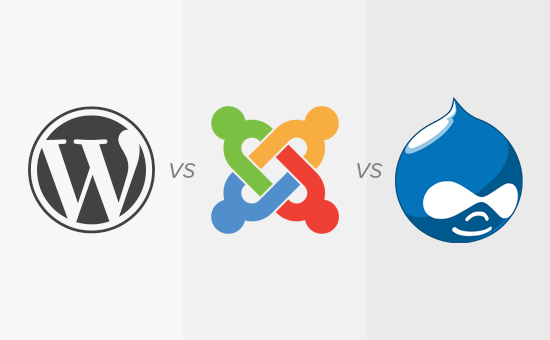
Remarque : Nous comparons WordPress.org et non le service d'hébergement WordPress.com. Veuillez consulter notre guide sur la différence entre WordPress.org et WordPress.com.
Qu'y a-t-il de commun entre WordPress, Joomla et Drupal
Les trois CMS les plus populaires du Web ont beaucoup en commun en termes de technologie, de philosophie et de communauté.
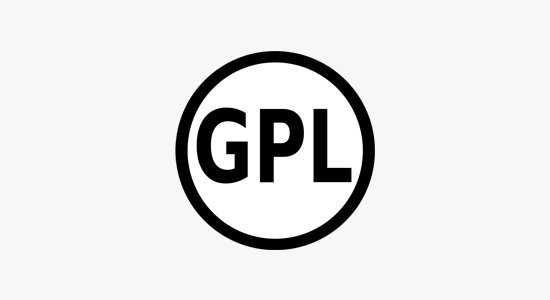
- WordPress, Joomla et Drupal sont tous des logiciels gratuits et open source sous licence GPL. Consultez notre article sur pourquoi WordPress est gratuit pour en savoir plus sur les logiciels libres.
- Tous les trois sont principalement écrits en PHP.
- Ils prennent tous en charge MySQL comme système de gestion de base de données. WordPress ne prend en charge que MySQL, tandis que Joomla et Drupal prennent en charge d'autres systèmes de gestion de base de données.
- Tous les trois utilisent des thèmes et des modèles pour l'apparence visuelle des sites, et des plugins, modules ou extensions pour étendre les fonctionnalités.
- En tant que logiciels open source, ce sont tous des projets communautaires.
Bien qu'il existe de nombreuses similitudes, ils diffèrent à bien des égards.
Par exemple, ils ont des politiques différentes concernant ce qui doit être inclus dans le logiciel principal, comment gérer les modules et les modèles, comment gérer la sécurité, etc.
Ces différences ont un impact majeur sur les utilisateurs et la manière dont ils construisent leurs sites Web.
Cela dit, examinons comment WordPress, Joomla et Drupal se comparent les uns aux autres, afin que vous puissiez choisir la plateforme de création de site Web la mieux adaptée à votre entreprise.
Facilité d'utilisation et convivialité pour les débutants
La plupart des personnes qui créent leur site web ne sont pas des développeurs web, des designers ou des programmeurs. Ce sont des utilisateurs moyens qui veulent simplement construire un site web. La facilité d'utilisation est le facteur le plus important pour la majorité des utilisateurs.
WordPress
WordPress est livré avec une célèbre installation en cinq minutes. La plupart des fournisseurs d'hébergement WordPress proposent également une installation de WordPress en un clic. Cela permet à un nouvel utilisateur de créer un blog ou un site web WordPress en quelques minutes, et non en quelques heures.
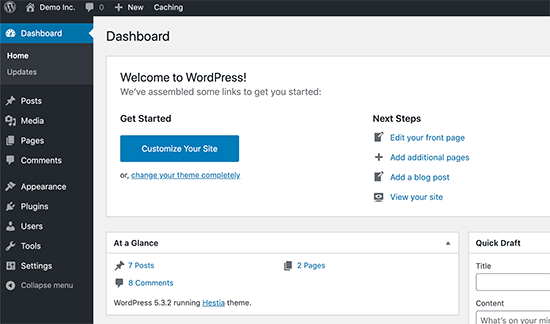
L'expérience utilisateur post-installation de WordPress est bien meilleure que celle de Joomla ou Drupal. L'utilisateur voit une interface utilisateur simple et épurée avec des menus pour créer des articles et des pages ou commencer à personnaliser l'apparence et les thèmes.
Joomla
L'installation de Joomla peut ne pas sembler aussi rapide que celle de WordPress, mais elle comporte des étapes très similaires. De plus, de nombreux fournisseurs d'hébergement partagé proposent également des packages d'installation en un clic pour Joomla.
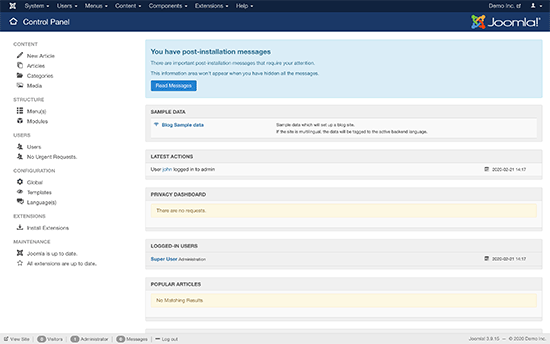
Après l'installation, l'utilisateur arrive sur un panneau de contrôle qui n'est pas aussi simple que celui de WordPress. Il y a tout simplement trop de menus à cliquer pour personnaliser le site.
Les fans de Joomla diraient que c'est parce que Joomla est beaucoup plus puissant que WordPress, mais nous n'y croyons pas.
Drupal
L'installation de Drupal est similaire à celle de Joomla et de WordPress. Il suffit de télécharger et d'uploader le package et d'exécuter le script d'installation.
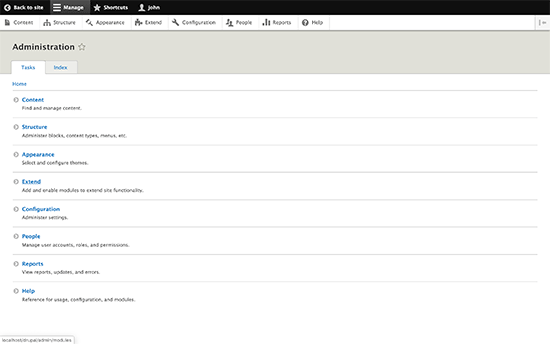
Drupal propose également des distributions. Ce sont des bundles Drupal pré-packagés avec des modules et des configurations pour créer des types de sites Web spécifiques.
L'expérience post-installation pour les débutants absolus est un peu compliquée. Les utilisateurs auront du mal à comprendre comment modifier les choses sur leur site. Drupal rend très évident comment ajouter du contenu, mais changer l'apparence et ajouter des éléments non liés au contenu n'est pas très évident.
Gagnant : WordPress
Thèmes et Extensions
Ces trois CMS populaires sont livrés avec des thèmes et des plugins/modules pour étendre les fonctionnalités et l'apparence du logiciel.
Les thèmes contrôlent l'apparence de votre site Web et comment il apparaît à vos utilisateurs. Les plugins ou modules sont comme des applications pour votre CMS.
Voyons comment ces trois logiciels CMS majeurs se comportent dans cette catégorie.
WordPress
WordPress permet aux utilisateurs de modifier l'apparence de leur site à l'aide de thèmes. WordPress est livré avec quelques thèmes par défaut pré-installés.
À tout moment, vous pouvez cliquer sur le bouton ajouter un nouveau depuis votre page Apparence et installer des thèmes WordPress gratuits à partir du répertoire officiel de thèmes WordPress.org.

En plus des thèmes gratuits, vous trouverez de nombreux thèmes WordPress premium développés par des boutiques de thèmes tierces comme StudioPress, Elegant Themes, et d'autres. Ce sont des thèmes payants qui incluent des options de support premium.
La véritable puissance de WordPress réside dans les plugins. Il existe plus de 59 000 plugins WordPress disponibles gratuitement dans le répertoire officiel des plugins WordPress. Vous pouvez également acheter des plugins premium qui incluent un support payant fourni par les développeurs de plugins. Consultez notre liste de plugins WordPress indispensables pour voir comment les plugins rendent WordPress génial.
Joomla
Comme WordPress, Joomla est livré avec des modèles et des extensions. Ces excellentes extensions peuvent faire à peu près n'importe quoi, de la création d'une boutique e-commerce à la gestion d'e-mails.
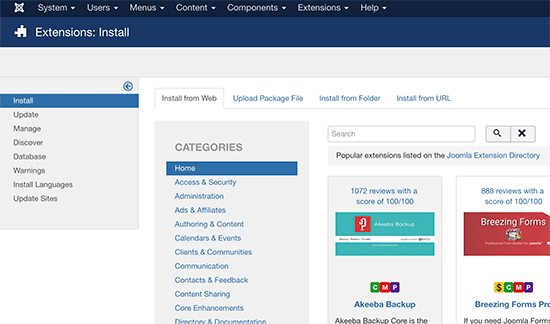
Cependant, la quantité de ces modèles et extensions n'est pas aussi élevée que celle de WordPress. Cela peut rendre la recherche du modèle parfait et des extensions parfaites un peu difficile.
Par défaut, Joomla ne dispose pas d'une fonctionnalité qui permettrait aux utilisateurs de rechercher et d'installer des extensions ou des modèles depuis la zone d'administration. Il existe une extension qui vous permet d'ajouter une fonctionnalité « installer depuis le web » pour les extensions. Mais pour les modèles, les utilisateurs devront toujours rechercher manuellement les modèles, puis les installer en ajoutant leur URL.
Drupal
Drupal a le même problème avec la disponibilité des thèmes et des modules. Les utilisateurs devront quitter leur site, rechercher le module et le thème qu'ils souhaitent ajouter, puis localiser l'URL du fichier zip du projet. Enfin, ils pourront entrer l'URL dans la page Modules ou Thèmes pour les installer.
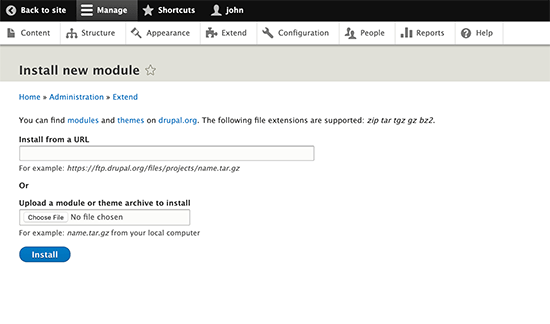
Il existe des modules pour faire à peu près n'importe quoi, et de nouveaux sont ajoutés régulièrement. Cependant, la quantité globale de modules fait défaut par rapport à WordPress.
Gagnant : WordPress.
Options de support
La disponibilité d'options d'aide et de support est très importante pour les utilisateurs débutants. Il y aura certainement des obstacles lorsque vous essaierez un nouveau logiciel. Ce n'est pas grave tant que vous pouvez obtenir de l'aide.
WordPress
WordPress a une communauté d'utilisateurs solide. Vous pouvez trouver de l'aide pour WordPress sur les forums de support officiels, la documentation, les manuels, le codex, les canaux Slack, Stack Exchange, le groupe Facebook WPBeginner Engage, et presque tous les forums sur Internet concernant la conception et le développement web.
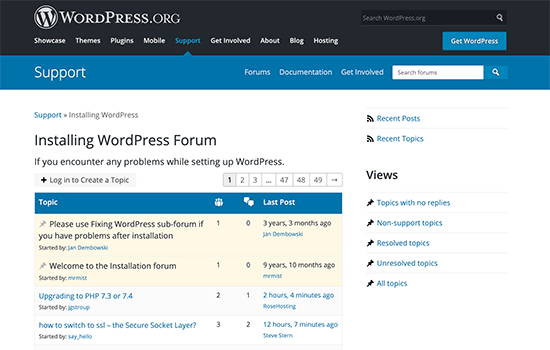
Il existe des sites comme WPBeginner, contenant des centaines de tutoriels, des tutoriels vidéo et des articles destinés aux utilisateurs de WordPress débutants. Il existe de nombreuses façons de demander et obtenir de l'aide gratuite pour WordPress.
En dehors des options de support gratuit, il existe également des moyens d'obtenir un support payant pour WordPress.
Des plateformes en ligne comme Codeable, Upwork et Fiverr ne sont que quelques-uns des endroits où vous pouvez engager des professionnels WordPress pour vous aider.
En raison de l'immense popularité de WordPress, trouver des développeurs WordPress est facile et abordable pour les petites entreprises et les particuliers.
Joomla
Joomla, comme WordPress, a une communauté large et très utile. Le site Web de Joomla dispose d'une documentation complète, qui est une ressource précieuse pour les débutants. Pour un support plus interactif, les utilisateurs peuvent rejoindre des forums, des listes de diffusion, des groupes d'utilisateurs, etc.
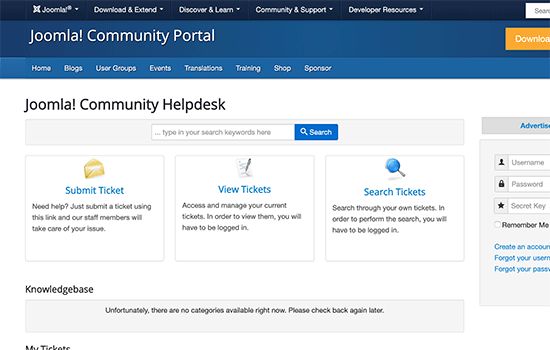
En dehors du support communautaire, il existe des ressources tierces, des formations payantes et des agences de développement qui peuvent être utiles.
Contrairement à WordPress, trouver une aide experte abordable est assez difficile pour Joomla. Engager un développeur ou un expert pour le développement, le dépannage ou l'assistance Joomla peut coûter beaucoup plus cher que WordPress.
Drupal
Drupal a une communauté de fans et d'utilisateurs très proactive. Comme WordPress et Joomla, vous trouverez toutes les options de support communautaire pour Drupal. Il existe une documentation exhaustive, un forum de support, des listes de diffusion, des groupes d'utilisateurs et des salons de discussion IRC — tous d'excellents endroits pour obtenir des conseils et de l'aide gratuite.
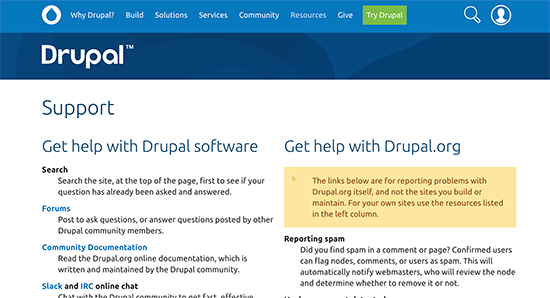
Drupal essaie de connecter les utilisateurs aux développeurs et aux entreprises proposant des services professionnels Drupal. Vous pouvez les trouver sur le Drupal Marketplace.
Cependant, les développeurs Drupal, tout comme pour Joomla, sont très chers par rapport à WordPress.
Gagnant : WordPress
Localisation & Support multilingue
Un grand pourcentage de sites Web créés chaque jour sont des sites non anglais ou multilingues. Il est beaucoup plus probable que de nombreux débutants recherchent un CMS capable de gérer plusieurs langues ou qui prend en charge différentes locales et langues.
WordPress
WordPress fait un excellent travail en offrant une bonne plateforme pour créer un site multilingue. Il ne prend pas en charge plusieurs langues nativement, mais il existe d'excellents plugins qui vous permettent de créer facilement un site WordPress multilingue.
WordPress est disponible dans plus de 57 langues. De nouvelles langues peuvent être installées en un clic depuis l'espace d'administration de WordPress.
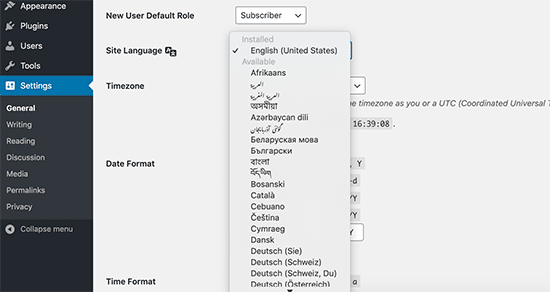
La plupart des thèmes et plugins populaires sont également disponibles en plusieurs langues, et les développeurs de thèmes et de plugins cherchent activement de l'aide pour traduire leurs packages dans d'autres langues.
Tous ces efforts font de WordPress une excellente plateforme pour créer un site web non-anglais ou multilingue.
Joomla
Joomla est doté de la capacité native de gérer un site web multilingue sans installer d'extension. Il suffit d'aller dans le gestionnaire de langues, d'ajouter une langue de contenu et de commencer à créer du contenu multilingue sur votre site web.
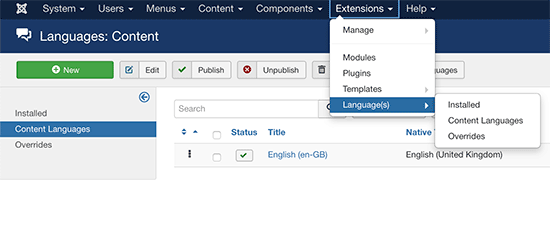
Les traductions sont également disponibles pour l'interface d'administration dans de nombreuses langues et peuvent être facilement installées depuis la zone d'administration.
Drupal
Drupal est doté d'un support intégré pour gérer les sites non-anglais ou multilingues. Vous devrez activer les modules locale et content translation. Après cela, vous pourrez ajouter les langues du site et de l'interface d'administration depuis la section de configuration de Drupal.
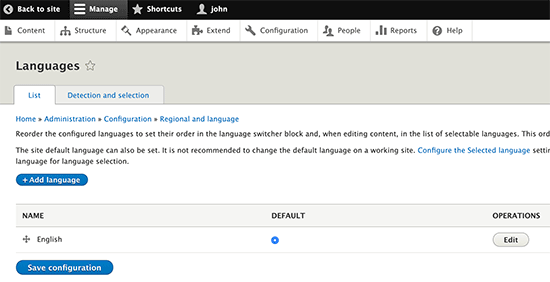
Gagnant : Égalité – Tous les trois prennent en charge les sites multilingues et sont disponibles dans plusieurs langues.
Sécurité
La sécurité est un facteur très important lors du choix d'un CMS pour votre site web. Presque tous les sites web sur Internet sont vulnérables aux menaces de sécurité.
WordPress
En tant que CMS le plus populaire au monde, les sites web basés sur WordPress sont souvent ciblés par les pirates. Cependant, WordPress est construit sur un code très sécurisé et répond très rapidement aux vulnérabilités de sécurité.
WordPress dispose également d'un mécanisme de mise à jour automatique qui permet aux sites WordPress de se mettre à jour automatiquement lorsqu'un nouveau correctif de sécurité est publié.
Les sites WordPress peuvent être davantage sécurisés avec des sauvegardes automatisées, une authentification à deux facteurs et d'autres bonnes pratiques de sécurité WordPress.
Il existe également un mécanisme intégré pour afficher les mises à jour des thèmes et des plugins WordPress. Cela permet aux développeurs de thèmes et de plugins de réagir rapidement à toute vulnérabilité de sécurité.
Joomla
Joomla est très similaire à WordPress en matière de sécurité. Ils réagissent activement à toute vulnérabilité de sécurité et sont très rapides pour la corriger. Cependant, la maintenance d'un site web et l'installation des mises à jour incombent toujours à l'utilisateur.
Il existe des extensions disponibles pour sauvegarder votre site Joomla. Vous pouvez également renforcer la sécurité de votre site Joomla en suivant les mêmes bonnes pratiques que pour WordPress.
Drupal
Drupal adopte une approche très sérieuse de la sécurité. Ils publient les vulnérabilités de sécurité sur leur propre site dès qu'elles sont découvertes et corrigées. On a l'impression que Drupal est plus sécurisé car on n'entend pas parler de piratages de sites Drupal aussi souvent, mais cela pourrait être dû au fait qu'il n'est pas aussi populaire que Joomla ou WordPress.
Gagnant : Égalité – Les trois suivent les normes de sécurité appropriées.
Conclusion :
Drupal, Joomla et WordPress sont tous d'excellents systèmes de gestion de contenu. Drupal et Joomla sont livrés avec beaucoup plus de fonctionnalités intégrées que WordPress.
Cependant, WordPress les surpasse par sa facilité d'utilisation, son immense communauté mondiale, ses plugins et ses thèmes. Nous pensons que la plupart des utilisateurs non développeurs trouveraient beaucoup plus facile de créer avec WordPress qu'avec Joomla ou Drupal.
Avec plus de 59 000 plugins WordPress, vous pouvez ajouter à peu près n'importe quelle fonctionnalité ou créer n'importe quel type de site Web que vous souhaitez (sans écrire de code).
Vainqueur général : WordPress
Comment démarrer avec votre CMS préféré
Que vous choisissiez WordPress, Joomla ou Drupal, vous aurez besoin d'un nom de domaine et d'un hébergement Web pour créer un site Web.
Heureusement, ces trois logiciels CMS parmi les meilleurs ont des exigences assez similaires, ce qui signifie que toutes les meilleures sociétés d'hébergement Web les prennent en charge.
Nous recommandons d'utiliser soit Bluehost, soit SiteGround. Ce sont deux des plus grandes sociétés d'hébergement au monde et elles sont spécialisées dans l'hébergement de sites Web WordPress, Joomla et Drupal.
Pour plus de recommandations, consultez notre guide complet d'hébergement Web pour débutants.
Si vous débutez avec WordPress, consultez notre guide pour débutants sur comment créer un site Web avec des instructions étape par étape.
Nous espérons que cet article vous a aidé à comparer WordPress, Joomla et Drupal, afin de trouver le meilleur CMS pour votre site. Vous pourriez également vouloir consulter notre comparaison de WordPress vs. Blogger ou notre vitrine de sites populaires utilisant WordPress comme CMS.
Si cet article vous a plu, abonnez-vous à notre chaîne YouTube pour des tutoriels vidéo WordPress. Vous pouvez également nous retrouver sur Twitter et Facebook.





mohadese esmaeeli
Certes, je n'ai aucune intention de m'impliquer dans une guerre des CMS. Cependant, d'après mon expérience (j'ai travaillé avec Joomla pendant 3 ans), WordPress peut fournir un meilleur retour d'information dans tous les domaines pour les grands sites Web. Typiquement, et prouvé, plus de 60 % des sites Web dans le monde utilisent WordPress, tandis que moins de 15 % utilisent Joomla. En général, WordPress a un monde magnifique pour lui-même. Bien sûr, avant de choisir un système de gestion de contenu, nous devons considérer la nature du site Web. Néanmoins, compte tenu des avancées incroyables que WordPress a réalisées et des plugins développés par de grandes entreprises mondiales, WordPress peut désormais être utilisé pour tout type de site Web.
Jiří Vaněk
J'ai essayé les trois systèmes éditoriaux et d'après ma propre expérience, WordPress est bon, surtout pour les débutants qui veulent apprendre à travailler avec le site web et comprendre les principes de base. WordPress me semble être le plus polyvalent et surtout, en cas de problème, il a une énorme base d'utilisateurs qui sont heureux d'aider à résoudre le problème gratuitement.
Priya Sinha
Merci pour la publication, de bonnes informations sur WordPress vs. Joomla vs drupal, lequel est le meilleur… c'est vraiment utile. Je le recommanderai à d'autres.
Support WPBeginner
Glad you found our comparison article helpful!
Admin
Tom Hardy
Excellentes informations ! D'après mon expérience, à mon avis, WordPress est le système de gestion de contenu le plus facile et hautement personnalisable. D'un autre côté, Drupal est complexe, mais il est le meilleur pour créer des sites web avancés ; c'est aussi un CMS très sécurisé. Joomla se situe entre ces deux CMS en termes de personnalisation, de facilité d'utilisation et de sécurité.
Support WPBeginner
Thanks for sharing your opinion
Admin
Duane Hamann
Je pense que cet article a raison. Pour le gars non qualifié qui cherche à mettre en place un site web géré respectable, WordPress est la meilleure option. Mais il a des limites que Joomla a surmontées. Pour quelqu'un qui est compétent en développement CMS, Joomla est le numéro 1 pour sa flexibilité avec des composants développés sur mesure, il est beaucoup plus technique, donc pour le gars qui cherche quelque chose de décent et facile à comprendre, WordPress gagne. Cependant, cela ne met pas en lumière WordPress par rapport à Joomla. Tout ce que cela dit, pour ceux qui n'ont pas de compétences en développement, WordPress est le meilleur. Pour ceux qui développent des applications PHP, Joomla est plus adaptatif et flexible, donc tout dépend des compétences individuelles.
Vast
J'ai créé de nombreux sites et j'ai utilisé les trois concurrents. Je trouve Joomla le plus polyvalent et le plus agile à utiliser, surtout pour les sites plus grands et complexes.
Mais même pour les petits sites, Joomla est super facile à utiliser.
Je pense que WordPress convient mieux au blogging et aux commentaires, et il est bien pour les petits sites. Il n'est tout simplement pas aussi facile à affiner que Joomla.
Ronald
si vous voulez quelque chose de simple et limité pour une page web, utilisez WordPress.
Si vous voulez quelque chose de complexe et sans limites pour développer des sites web, utilisez Drupal.
Drupal est meilleur !
Okanime
Comment reconnaître un gars « bon en informatique » qui se fait passer pour un concepteur web – quand il vous dit qu'il construira votre site avec un CMS WordPress. Si vous trouvez Joomla difficile à utiliser ou à maintenir, sérieusement, vous devriez arrêter d'utiliser tout appareil électronique. C'est votre obligation de nous rendre ce service.
Mark
Un site web sur WordPress dit que WordPress est le meilleur… Quelle surprise…
Jiten
J'utilisais WordPress depuis 2010. En tant que concepteur web, je conçois et livre toujours des sites web en WP, mais il y a quelques années, certains sites ont été piratés. N'oubliez pas qu'une fois votre site piraté, il n'y a qu'une seule solution pour éliminer complètement l'infection : « TOUT SUPPRIMER », car une fois attaqué, aucun plugin ne pourra tout nettoyer.
Maintenant, je passe de WP à Joomla.
Okanime
Joomla est magnifique. Je ne comprends pas pourquoi il a mauvaise réputation. Joomla 3.x est maintenant bien meilleur que WordPress à tous égards.
Duarte
Comparer Drupal et WordPress, c'est comme comparer une voiture à un bateau, ou des pommes à des oignons. Ils sont tous deux excellents dans leur propre domaine. Selon divers facteurs, vous devriez utiliser l'un ou l'autre, mais ce devrait être pour un autre article.
J'utilise les deux et pour moi, une chose pour laquelle WP n'est pas très bon, ce sont les plugins. Il est vrai que WP a des milliers de super plugins, mais la plupart d'entre eux se répètent en termes de fonctionnalités et d'autres sont freemium, ce qui signifie que vous devez payer si vous voulez le produit complet. De plus, ils ont tendance à être des solutions clés en main sans penser à l'évolutivité. Et il en va de même pour les thèmes.
Drupal a une politique stricte de modules contribués non répétés et ils sont tous gratuits (Open Source), aucun module ou thème freemium n'est autorisé. Les modules dans Drupal ressemblent davantage à des bases pour que vous puissiez développer vos fonctionnalités avec votre propre code ou avec d'autres modules. Une bonne partie des modules Drupal n'ont pas de sorties visibles, ils servent uniquement de connexions backend entre les fonctionnalités.
Je ne peux pas parler de Joomla. Aucune expérience à ce sujet.
Mark
Bien que WP ait de loin la plus grande gamme de thèmes et de plugins, la plupart de leurs thèmes sont de pures répétitions et duplications, ennuyeux en général et créés avec très peu de créativité.
Il en va de même pour les plugins WP. Pour aggraver les choses, vous devez vous disputer avec une armée de développeurs de plugins qui se rejettent la faute, chacun assurant que votre site web cassé est le résultat d'un « autre » plugin installé, rien à voir avec eux.
Avez-vous déjà entendu le dicton : « trop de cuisiniers gâchent le plat » ?
Cela s'applique à 100 % à WP.
Je n'utiliserais jamais WP, pas même si c'était le dernier CMS restant sur la planète. Plein de bugs, de plugins incompatibles, d'énormes vulnérabilités de sécurité, de designs sans vie, et un million de hackers de code incompétents qui prétendent tous être des « programmeurs web professionnels ».
Sam
Je suis totalement d'accord avec vous.
Paul
Je n'ai jamais eu de problèmes de sécurité avec WordPress, et concernant les « designs sans vie » – si vous avez les compétences nécessaires (ou engagez un designer compétent), la seule limite à l'apparence de votre site WordPress est votre imagination.
Tenez-vous-en à des thèmes et plugins bien établis (et supportés), et vous ne pouvez pas vraiment vous tromper.
Bizzo
Vous pouvez créer un site web d'assez belle apparence avec Wordpress, cependant ce qui devient assez vite évident, c'est que c'est un blog et qu'il est presque impossible de dépasser cela. Si vous voulez un blog, super ! Sinon, il faudra énormément de temps et d'énergie pour le personnaliser afin qu'il ne ressemble pas à un blog typique.
Soit dit en passant, quelqu'un a mentionné que la WNBA utilisait WordPress. Notez que NBA.com utilise Drupal.
Nikola
Je peux admettre que WordPress est plus populaire que Joomla, mais pas qu'il est meilleur.
La popularité de WordPress est due à une campagne négative menée contre Joomla.
Internet est inondé d'articles comme celui-ci où certaines personnes racontent absolument des mensonges et des absurdités sur Joomla.
Cordialement
Fred
Pour ceux qui veulent migrer de Drupal vers WordPress, ils peuvent utiliser l'outil gratuit FG Drupal to WordPress
PATRICK MUSUMINA M.
WordPress offre plus d'interface utilisateur que Drupal et Joomla
Niels Klint
Absolument faux
Nikola
Je suis d'accord.
Alex
Pas pour un client. Nous développons toujours des thèmes personnalisés en utilisant différents CMS et les clients préfèrent toujours WordPress pour modifier leur site. Parce que c'est plus facile à comprendre pour eux grâce à l'interface utilisateur.
Frank Yusuf
WP est un bon système de gestion de contenu, il simplifie la conception de sites Web avec ses thèmes et plugins divers. Dans le passé, la conception de sites Web était une tâche herculéenne, mais avec l'arrivée de WordPress, le code est devenu de la poésie.
greg
WordPress does an excellent job at offering a GOOD PLATFORM to build a MULTILINGUAL site. It does NOT SUPPORT multiple languages out of the box, but… Yes, awesome platform!
Rahul
wow… après avoir lu ce tutoriel, je devrais configurer WordPress pour mon blog
waqas
J'utilise Joomla et ensuite les frameworks YT dans Joomla. Je pense que pour les sites avancés, Joomla est meilleur en raison de la facilité de création de nouvelles positions de modules et d'autres personnalisations avec les thèmes et les modules. Bien que pour les petits blogs, WordPress soit meilleur. Mais dans Joomla, si vous êtes un professionnel, je pense que vous pouvez créer des blogs encore meilleurs dans Joomla.
Joris
Je suis d'accord, mille options supplémentaires pour de nombreux types de blogs différents sur un seul site sans aucun codage. Essayez cela dans WordPress et vous devrez créer plusieurs thèmes ou utiliser des constructeurs de pages.
Pour WordPress, vous avez besoin de beaucoup plus de connaissances pour personnaliser les paramètres des blogs.
Prêt à l'emploi et la gestion des médias, c'est WordPress le gagnant. Le multilinguisme n'est pas dans WordPress et WPML est une plaie.
Darren
J'ai utilisé un certain nombre de CMS au fil du temps et de loin le pire que j'aie jamais trouvé a été WordPress. Je suis très surprise qu'il soit arrivé en tête et encore plus surprise qu'il soit arrivé haut pour la sécurité.
J'ai trouvé un certain nombre de problèmes de sécurité stupides avec WordPress – par exemple, si vous ne savez pas ce que vous faites et que vous construisez un site, quelqu'un peut facilement ajouter des variables GET à la fin des sites WordPress et les utiliser facilement pour récupérer le nom d'utilisateur du propriétaire du site – ok, le mot de passe est toujours caché, mais n'importe quel pirate est à mi-chemin.
J'utilise normalement Joomla pour la conception de sites Web car je trouve cela facile, mais encore une fois, j'ai passé de nombreuses années à apprendre le C++ à l'université et j'ai converti ces connaissances en PHP.
En ce qui concerne Drupal, j'apprends actuellement quelques notions de Drupal et je dois admettre que certaines parties semblent vraiment bien. Le seul inconvénient que je trouve est le cache ; lorsque l'on essaie de concevoir un modèle, le cache gêne un peu. Il semble également étrange d'avoir des sous-thèmes distincts des thèmes principaux.
J'ai récemment rencontré un cauchemar avec le thème adaptatif car je voulais modifier légèrement le code du menu, alors j'ai copié ce que je pensais être le code du menu (c'était adaptivetheme_menu_tree et adaptivetheme_menu_tree (vous devineriez que c'est ce qui crée le menu étant donné que son titre contient le mot MENU !!)), il s'est avéré ne rien faire – je ne sais même pas ce que fait cette section de code. Au lieu de cela, j'ai découvert qu'il mélange le menu principal avec adaptivetheme_links qui est également utilisé par plusieurs autres fonctions – et il n'y avait même aucun moyen approprié de les séparer, j'ai donc dû le découvrir en interrogeant l'ID de l'en-tête et s'il s'agit de primary_menu, ce doit être le menu que je recherche.
Malheureusement, je suis dans une entreprise qui a un site web basé sur Drupal et qui pense que Drupal est la meilleure chose depuis le pain tranché, donc je dois essayer de travailler avec. J'espère que plus j'utiliserai Drupal, plus je le comprendrai – j'ai déjà créé un lien de raccourci vers le dossier sites/all car cela me dérangeait de devoir passer par tous ces répertoires juste pour accéder à l'endroit où je peux éditer (dans Joomla, c'est directement dans le dossier des modèles et vous avez tous vos thèmes et remplacements qui vous attendent !).
Heidi
Salut Darren. Il semble que vous ayez une grande expérience de Joomla et que ce soit un peu hors sujet… Cependant, j'ai un site Joomla 1.5 qui doit être mis à jour avec un thème réactif pour une organisation à but non lucratif à proximité. Je suis plus un designer qu'un programmeur web. Avez-vous des suggestions sur la meilleure façon de procéder – ou des conseils avant que je commence ?
Merci.
Syahir Roslan
Pour autant que j'aie de l'expérience avec Joomla, c'est vraiment difficile si vous mettez à niveau depuis Joomla 1.5 ou 2.5, ce n'est pas impossible mais cela réussira avec de nombreuses erreurs, donc je suggère qu'il est préférable de migrer le contenu et d'utiliser le dernier Joomla car il prend en charge des thèmes et des modules plus réactifs. Et aussi Wordpress est le pire et je n'ai pas encore essayé Drupal.
Darren
Salut Heidi
Je n'ai pas utilisé Joomla 1.5 depuis de nombreuses années, la plupart de mes sites sont basés sur Joomla 3.x car c'est probablement le plus réactif d'entre eux.
Votre meilleure option si vous voulez rendre un site plus réactif est de vous pencher sur l'API Boostrap et d'inclure le CSS Bootstrap car un bon nombre de menus et de colonnes réactifs peuvent être créés avec bootstrap et ils se convertissent automatiquement pour avoir un bon rendu sur les téléphones mobiles et les écrans de bureau.
Pour passer de l'un à l'autre – je suggérerais fortement de faire une sauvegarde complète de votre site avant de commencer (y compris la base de données SQL), et peut-être de construire le nouveau site dans un emplacement de test d'abord avant d'écraser le site existant (par exemple, créez-le dans un dossier temporaire d'abord, assurez-vous que tout fonctionne, puis déplacez le site vers le dossier principal – et n'oubliez pas de modifier configuration.php avec les nouveaux détails d'emplacement – et si vous avez utilisé un serveur SQL différent, modifiez également les détails du serveur SQL dans configuration.php, bien que si vous l'avez simplement construit dans un dossier séparé sur le même hôte, les paramètres SQL ne devraient pas nécessiter de modification).
Regardez aussi l'utilisation de la dernière édition de Joomla – actuellement c'est la 3.6.2 – car cela vous donne la dernière version avec les derniers correctifs de sécurité et les futures mises à niveau devraient être plus faciles. À partir de Joomla 3, ils ont rendu le processus de mise à niveau assez simple et facile pour conserver les données existantes, mais passer de la version 1 à la version 3 pourrait signifier que vous devrez copier-coller la majeure partie du site d'origine si vous voulez qu'il ait les mêmes données.
Scott...
Bien sûr, WordPress est arrivé en tête, c'est un site pour débutants WordPress, vous ne vous attendiez pas vraiment à ce que l'examen soit objectif. C'est essentiellement un argumentaire de vente où seuls les bons points sont élaborés.
Brian
J'utilise Wordpress et Joomla depuis longtemps maintenant et Joomla, tout en ayant quelques fonctionnalités intéressantes par rapport à Wordpress, souffre énormément du manque de bonnes extensions (surtout gratuites). Parfois, il me faut des heures pour trouver la bonne et la faire fonctionner, ce qui n'arrive jamais avec Wordpress où je peux chercher et quand je trouve, il y a un bon support et une bonne documentation. Sans parler du fait que certaines fonctionnalités ne fonctionnent pas très bien dans Joomla, comme le téléchargement d'images dans une galerie qui peut être un vrai casse-tête. Par conséquent, faire en sorte qu'un site Joomla ressemble et fonctionne comme vous le souhaitez est plus une question de chance que d'effort, cependant, une fois que vous y arrivez, cela fonctionne bien, même le support bilingue est excellent. De plus, l'utilisation d'extensions de publication comme K2 peut compliquer les choses, beaucoup. Je recommanderais sans hésiter Wordpress aux débutants et Joomla aux utilisateurs plus avancés et aux concepteurs de sites Web expérimentés.
Niels Klint
« Par conséquent, faire en sorte qu'un site Joomla ait l'apparence et le fonctionnement que vous souhaitez relève plus de la chance que de l'effort, cependant »
Absolument faux – mais plus il y a d'opportunités dans un système, plus vous devez être capable de les exploiter
Petr
J'ai l'habitude de construire des sites avec Wordpress et Joomla ! mais la plupart du temps, lorsque j'avais terminé un site Web construit avec Wordpress, le client demandait une nouvelle fonctionnalité spécifique qui n'était pas facilement implémentée dans WordPress (parfois, c'était impossible), alors je retravaillais le site dans Joomla !. Même si Wordpress est populaire, simple et facile, j'utilise principalement Joomla ! en raison de sa complexité et de la possibilité de personnaliser facilement et puissamment le code (car il existe des techniques de codage modernes et performantes qui peuvent être facilement étendues). Mais je les aime tous les deux – Wordpress pour les sites Web vraiment simples (blogs) et Joomla ! pour les sites Web complexes.
bill
Vous avez dit « Presque tous les sites Web sur Internet sont vulnérables aux menaces de sécurité. ». Je dirais que vous devriez réviser cette déclaration et dire QUE TOUS les sites Web sont vulnérables aux menaces de sécurité. S'il a une adresse IP, alors il est vulnérable.
Bucur
J'ai utilisé les trois principaux systèmes (WP, Drupal et Joomla) dans un environnement d'entreprise (grand).
Du point de vue de l'*utilisateur*, j'ai détesté Drupal avec la fureur de mille soleils. Je l'ai trouvé lourd, restrictif (et pas dans le bon sens) et parfois tout simplement déroutant. Bien sûr, j'avoue que j'étais biaisé en l'abordant car j'avais déjà utilisé J! et WP de manière intensive, ainsi qu'un autre CMS d'entreprise "réel", et je m'attendais à une expérience similaire.
Et, en tant que personne qui travaillait auparavant pour un département gouvernemental qui avait adopté Drupal – ce n'était pas parce qu'il était sécurisé, c'était parce que "la Maison Blanche l'utilise" et qu'il était "gratuit", et ces deux raisons sont tellement erronées qu'elles sont stupides. *roulement d'yeux*.
Après mon expérience d'utilisation de Drupal sur de grands sites internet et intranet, je ne l'envisagerais plus jamais sérieusement. Tel quel et même après des modifications et des extensions importantes, il ne pouvait pas faire de publication programmée, on ne pouvait pas travailler sur une version brouillon d'une page (et sauvegarder le brouillon) et tant d'autres problèmes mineurs côté utilisateur qui ont rendu ma vie de webmaster misérable.
Cependant, après avoir utilisé WP ces dernières années, c'est mon système de prédilection pour les sites de publication, principalement parce qu'il est si facile d'apprendre aux autres utilisateurs (non techniques) à l'utiliser et que la sécurité peut être largement gérée si un peu de soin est apporté dès le départ.
Paddy
Bonjour, je suis programmeur front/backend pour des projets personnels depuis des années - et je pense maintenant à commencer à créer des sites web pour des clients. Permettre aux « non-techniciens » de mettre à jour les sites web après la livraison est un peu nouveau pour moi. Cela n'a vraiment commencé à me marquer qu'après avoir créé un site web pour une amie et qu'elle m'ait dit à la légère « comment puis-je le mettre à jour ? ». Est-ce que je suppose correctement que WP, J! et Drupal conviennent à la livraison de sites web professionnels pour des clients ? Si c'est en partie parce qu'ils sont gratuits, y en a-t-il d'autres que vous recommanderiez d'utiliser, même si elles sont payantes ?
K Johnson
Hmm… un site appelé wordpress beginner déclarant wordpress vainqueur dans toutes les catégories sauf une. Pas très objectif à mon avis.
Brooks
Lorsque l'on examine la scalabilité fonctionnelle et l'architecture de chacun des produits examinés, il n'y a pas de comparaison. Aucune.
WP a été initialement conçu comme un simple outil de blog, puis a été révisé pour gérer des fonctionnalités de type CMS :
– Les divers plugins populaires pour gérer l'édition de base, la structure et les fonctionnalités étendues de CMS se chevauchent et entrent fréquemment en conflit les uns avec les autres.
– La scalabilité structurelle des pages et des blogs WP est une fonction des plugins, pas de l'architecture WP sous-jacente.
– Il est douloureusement évident qu'une grande partie de l'administration, de la conception, etc. de WP a été ajoutée après coup. L'architecture sous-jacente centrée sur le blog rend très difficile l'ajout de fonctionnalités CMS de manière intuitive.
Drupal, en revanche, a été conçu dès le départ pour évoluer fonctionnellement. Le compromis évident est la courbe d'apprentissage.
Mais, d'après mon expérience, la perte de productivité due au travail avec l'architecture faible de WP (surtout lors de la tentative d'implémentation de fonctionnalités plus complexes) ou à la gestion de composants tiers conflictuels, dépasse la courbe d'apprentissage de Drupal.
Donc, peut-être qu'un meilleur qualificatif pour faire cette comparaison serait :
– Si vous avez besoin d'un outil de blogging simple, WP est probablement le plus approprié.
– Si vous avez besoin d'un outil CMS robuste, alors Drupal est le plus approprié.
À mon avis, Joomla est une solution de compromis – pas la plus facile pour le blogging de base et la conception de sites web, mais pas la plus robuste pour les fonctions CMS.
Je dis ça, je dis rien…
Keith
Le problème que j'ai trop souvent rencontré avec Wordpress, c'est que, bien qu'il ait clairement plus de plugins que les autres, beaucoup d'entre eux, même les payants, sont développés avec une mentalité du genre « ouais, ça répond plus ou moins à l'exigence », et « S'ils veulent quelque chose qui fasse ce qu'ils veulent vraiment, ils devront nous payer plus cher ». Je vois cela sans cesse avec une solution Wordpress/WooCommerce actuelle sur laquelle je travaille pour un client. Ils le veulent dans Wordpress. Je vais le leur donner dans Wordpress, mais ça ne devrait pas être aussi frustrant.
Mustafa
Merci pour cette comparaison, très utile.
Edujobsbd
Je pense que WP est meilleur que les trois.
SREERAJ
Merci pour l'article.
Je me suis vraiment forcé à ajouter ce commentaire, Wordpress est PIRE en termes de sécurité et clairement Drupal est le gagnant là-dessus.
Vladus Wizard
Bonjour. Cet article est l'opinion subjective de l'auteur. Tous ces CMS ont des avantages et des inconvénients. Personne ne peut répondre à la question de savoir quel CMS utiliser. Cela dépend du cas spécifique.
Fordiy
Pour un usage professionnel, il faut que ce soit Joomla. J'ai été tellement déçu quand j'ai installé WordPress pour la première fois. En fait, WordPress n'est PAS bon pour un site commercial.
Atanas
Pourquoi ?
Mervink
Intéressant, pourquoi dites-vous que ce n'est pas bon pour un usage commercial ? Je veux dire, beaucoup d'agences numériques préféreraient travailler avec WP, malgré le facteur sécurité, je n'hésite vraiment pas à l'utiliser à des fins commerciales.
Amanda
Si je peux me permettre, bien que je ne sois pas l'utilisateur le plus expérimenté, j'ai fait mes recherches et, comme cela a été souligné dans d'autres commentaires, WordPress a été conçu pour être un outil de blogging et rien de plus. Il n'était PAS destiné au commerce. Ils ont maintenant des plugins pour compenser ce manque de fonctionnalités, mais pour comparer cela à un CMS qui a cette fonctionnalité dès le départ, comme Drupal ou Duda, WordPress va évidemment perdre. S'il nécessite une extension, il est presque garanti qu'il ne fonctionnera pas aussi bien que s'il faisait partie du codage de base. Il existe en effet beaucoup de sites commerciaux qui utilisent WordPress, mais comme un autre commentateur en fait l'expérience, c'est souvent parce que cela a été demandé par un propriétaire d'entreprise qui ne sait pas mieux et cela rend la vie considérablement plus difficile qu'elle ne devrait l'être pour le développeur. Le développeur sera-t-il CAPABLE de créer un site commercial avec WordPress ? Certainement. Sera-ce aussi facile que cela devrait l'être ? Probablement pas (bien qu'une fois que vous y êtes habitué, cela ne vous semblera probablement pas être un gros problème, surtout si vous n'avez pas utilisé un autre CMS à cette fin). Et ils factureront généralement plus cher à leur client pour leur peine.
Mickaël andrieu
Salut, bon article.
De plus, je ne pense pas que nous devrions considérer uniquement les trois principaux CMS lorsque nous devons construire un site Web : il existe un CMS pour chaque besoin spécifique.
Par exemple, je travaille avec un nouveau CMS basé sur des composants Symfony et un puissant système d'édition sur page : BackBee
So, don’t be shy and check all theses new “next gen” CMSes
Allan Philip
Merci pour cet éclaircissement sur les 3 plateformes CMS. J'ai toujours utilisé Wordpress en raison de la facilité d'installation, de modification et d'installation de plugins sur un blog. Pour moi, Wordpress est le roi des plateformes de blogging pour la simplicité d'installation et de création de blogs.
EMM
J'ai commencé ma carrière en développement web en utilisant Dreamweaver/HTML. Wordpress était à l'époque une excellente plateforme de blogging, mais en faire un site web était très difficile. J'ai d'abord essayé Joomla parmi les 3, mais c'était tellement peu intuitif que je n'arrivais pas à saisir le concept de CMS et son fonctionnement. Puis un ami m'a suggéré Drupal, que j'ai utilisé exclusivement pendant plus de 3 ans. J'aimais la flexibilité et la puissance de Drupal, ainsi que le contrôle que j'avais sur les types de contenu, les vues, les permissions, etc. La personnalisation et la mise à jour sont les deux plaies de mon existence, cependant, en ce qui concerne Drupal. Si ces deux éléments étaient aussi faciles qu'avec Wordpress, je ne quitterais probablement jamais Drupal car je peux faire tellement plus avec.
Puis il y a environ 3 ans, j'ai été embauché pour travailler sur certains sites Wordpress – à contrecœur, je dois l'ajouter – mais une fois que j'ai vu qu'il avait beaucoup progressé, j'ai commencé à l'utiliser pour la plupart des sites web que je construis, en raison de la facilité de mise à jour et de personnalisation. Je pense toujours que la sécurité est un peu bancale, mais en réalité, aucun CMS ne semble être sécurisé à 100 %.
J'aime mieux Drupal, mais je finis par utiliser WP à cause des points que j'ai mentionnés ci-dessus.
Shannon McNaron
Je pense que vous avez oublié de considérer lequel peut réellement gérer de grandes quantités de contenu. Si un site est petit et stagnant, peut-être que Wordpress est le meilleur, mais quand il grandit, je pense qu'ils passeront aux gros calibres, alors pourquoi ne pas commencer à apprendre et à travailler avec le bon CMS dès le départ ?
Bruce
Je suppose que personne n'a dit à newyorker.com et thenextweb.com que WordPress ne peut pas gérer de grandes quantités de contenu.
Ce ne sont que 2 exemples de sites Web à contenu important et à fort trafic utilisant WordPress avec succès
edvard eidem
En tant que développeur web professionnel depuis de nombreuses années. laissez-moi exprimer mon opinion.
Je suis d'accord pour dire que WP est le CMS le plus facile des trois, mais un aspect très important est totalement absent : la SÉCURITÉ. Si vous avez une grande entreprise qui dépend à 100 % de votre site Web, vous devez vraiment renforcer la sécurité par tous les moyens possibles. Même dans ce cas, WP n'est pas plus de 95 % sécurisé.
La sécurité est l'une de mes principales préoccupations et pour mon plus gros client (une grande maison de médias), je ne considérerai jamais WP. J'utilise des CMS moins connus qui ne sont pas sur les listes de hackers.
Un de mes anciens clients vient de se faire pirater même avec un pare-feu PRO et un mot de passe généré de 13 caractères. Cela s'est fait via un plugin. Les plugins et les modèles sont très souvent à blâmer.
Joomla, d'ailleurs, n'est pas sûr non plus. Trouvez autre chose. Mon vote pour la sécurité va à CMS Made Simple. Je n'ai jamais entendu parler d'un site CMS Made Simple piraté.
De plus, un vote d'un site WP comme celui-ci est très biaisé, vous devez donc vraiment rechercher des avis sur un site non biaisé.
Cordialement E, Norvège
edvard eidem
Je ne peux pas modifier le message, je devrai donc ajouter un commentaire moi-même.
La sécurité n'est pas totalement absente, ma faute.
Mon point est que WP n'est pas assez sûr tel quel. Joomla non plus.
E. Norvège
Joris
J'ai plus de 100 sites Joomla à gérer, 2 fois j'ai été piraté. 1 n'était pas sur mon serveur et était obsolète, l'autre était obsolète depuis 7 ans.
Joomla est sécurisé mais l'utilisation de plugins peut causer des problèmes (:
Avec WordPress, j'ai eu quelques sites piratés à réparer et ils étaient toujours obsolètes (:)
Santhoshveer
WordPress est le meilleur jamais Mon meilleur CMS nous pouvons créer un site Web comme des blogs, des sites de téléchargement, des paniers d'achat, des sites de médias sociaux avec notre codage personnalisé, des plugins et des thèmes
Rikáryo Mourão
Utilisez les 3 CMS et celui qui me pose toujours des problèmes est Wordpress, y compris le processus de mise à niveau est toujours complexe dans WP et les clients m'ont demandé l'avis de Crackers pour résoudre les problèmes et Joomla ! aujourd'hui est intact comme il le dit, des violations de sécurité.
Pensez juste que le résultat était biaisé.
Zaki Honey
merci pour la super comparaison, j'ai une question, pourquoi presque toutes les entreprises veulent utiliser joomla au lieu de wordpress ? je vois ça beaucoup quand elles cherchent un programmeur ou quelqu'un pour leur faire un site web, elles veulent joomla ?
flankerp
Je pense que dans Workdpress, vous ne pouvez pas gérer les paramètres de politique, vous ne pouvez pas avoir différents droits d'accès pour un groupe d'utilisateurs. J'utilise WP et Joomla 3. Pour les petits sites faciles, WP est meilleur car il est beaucoup plus rapide. Cependant, si vous avez besoin de gérer les droits d'accès pour différents groupes et de créer des politiques, alors Joomla est la solution.
À mon avis, ce sont deux produits différents. WP est pour le blogging et Joomla est le véritable système CMS. Ils sont différents et on ne peut pas comparer. Sur les deux, on peut trouver des points communs mais ils sont différents et à mon avis on ne peut pas dire que l'un est meilleur que l'autre.
Support WPBeginner
WordPress est livré avec un système de gestion des rôles d'utilisateur robuste. Il peut être facilement étendu à l'aide d'un plugin et les développeurs peuvent créer n'importe quelle combinaison de permissions dont ils ont besoin.
Admin
Silvio Jesus
Heh, je m'attendais évidemment à ce qu'un site web dédié à WP fasse de WP le vainqueur d'une telle comparaison.
Bien que je sois d'accord avec presque tout l'article, il n'y a pas d'égalité sur l'aspect multilingue. WP, tel quel, ne donne pas à l'utilisateur une plateforme multilingue, et le simple fait qu'il faille obtenir un plugin pour le faire en fait un perdant dans cette catégorie.
Donc… L'article était plutôt juste jusqu'à ce que vos « sentiments de fanboy wp » brouillent votre jugement.
PS : Je pense que wp est le meilleur des trois, mais cela n'excuse pas les articles biaisés.
Cordialement,
S.J.
Fernando
Qu'en est-il de la scalabilité ? J'ai eu des sites Wordpress qui ne pouvaient pas bien gérer beaucoup de trafic. Pouvez-vous dire lequel est le meilleur pour la scalabilité et faire un tutoriel vidéo ultra avec toutes les étapes pour créer un site Wordpress vraiment très scalable, un que nous pouvons mettre dans une publicité télévisée et obtenir des milliers de clics à la fois ?
Cordialement
nero d'Intuitive Design
Je suis d'accord avec Fernando concernant la scalabilité. De plus, j'aime la critique car elle est axée sur les non-développeurs et est très claire. Cependant, j'aurais aimé une section sur les avantages de chacun. Wordpress gagne dans les sections que vous choisissez ; cependant, en tant que développeur (et j'ai installé et joué avec toutes les plateformes ; mais je ne les ai pas toutes utilisées activement pour le développement – principalement le développement wp en ce moment), j'aimerais connaître les avantages et les forces des deux autres plateformes pour savoir quand elles mériteraient d'être examinées pour le développement de sites Web spécifiques.
Merci,
Tamer
Jon
Un site qui ne peut pas gérer beaucoup de trafic rencontre des problèmes d'hébergement, pas un problème WordPress. Exemples de sites WordPress qui reçoivent des tonnes de trafic : site WNBA, Mashable, The San Francisco Examiner, site web de Garth Brooks, Mercedes Benz, beaucoup d'autres ici : https://wordpress.org/showcase/archives/.
John Lewis
Je suis d'accord... Ou c'est un problème local. c'est-à-dire votre connexion Internet.
Cliff
Fernando, la scalabilité est en grande partie un produit de l'environnement d'hébergement (ressources serveur, bande passante, équilibrage de charge, etc.) et non du logiciel du site Web lui-même. Je doute que tout cela soit couvert dans une seule vidéo.